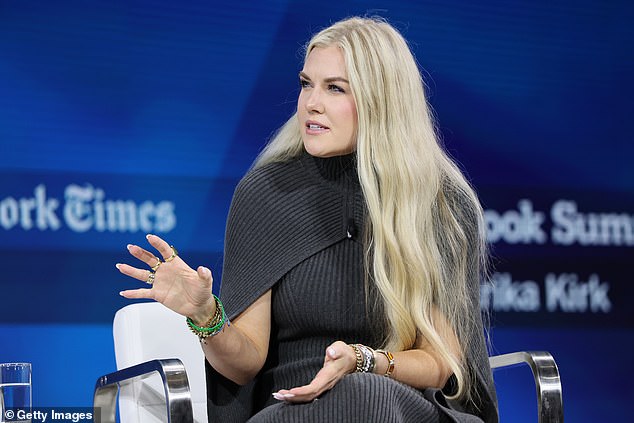Candace Owens is once again stirring controversy, this time targeting Turning Point USA (TPUSA) with a series of public comments and social media posts.
The conservative commentator, who once worked closely with founder Charlie Kirk, has drawn sharp criticism for comparing TPUSA’s response to criticism with that of groups like Black Lives Matter.
Owens’ latest remarks follow an intensely personal warning from Erika Kirk, who now leads the organization after her husband’s assassination.
Owens Fires Back at TPUSA Leadership
Owens claimed on social media that TPUSA is blocking scrutiny in the same way she alleges other liberal organizations suppress criticism.
She wrote, “It is a positively ABSURD notion that you cannot critique a 150 million dollar organization because the CEO says they are like a family and are grieving.
It is the exact same emotional strategy deployed by BLM in the wake of George Floyd’s death.
I rejected it then and I wholly reject it now.”
The remarks were directed at the organization now led by Erika Kirk, who assumed the CEO role after her husband’s death.
Erika has made it clear that she will not tolerate online attacks against her colleagues.
A Personal Feud Played Out Publicly
Owens’ anger continued, highlighting her frustration with what she sees as hypocrisy in politics.
“I’m starting to think I have a learning disability because it’s been years and I cannot learn to be like these other hypocrites in politics who can call out David Hogg and BLM for using tragedy to shut down inquiry, but now think it’s EVIL when it comes to TPUSA,” she tweeted.
Her comments come amid a long history of conspiracy theories, including financial fraud allegations about TPUSA that have been publicly denied by the Treasury Department.
From Ally to Critic
Owens was a prominent voice at TPUSA, serving as a speaker and director of communications until 2020.
She parted ways with the organization after disagreements over her increasingly controversial views.
Since Charlie Kirk’s assassination, Owens has intensified her attacks, alleging internal betrayal and questioning the official account of the lone shooter.
TPUSA even invited Owens to a public livestream debate to address the accusations directly.
Digging Into Kirk’s Personal Life
During a recent episode of her podcast, Owens shared stories about Kirk’s dating life before he married Erika.
She recalled serving as his “wing-woman” and even displayed a text message from Kirk preparing for a date with another woman, describing it as “one of my favorite text messages between me and Charlie.”
Owens’ commentary, which some view as a personal slight toward Erika, underscores the tension between the podcaster and TPUSA’s current leadership.
Erika Kirk Responds on Fox News
Erika Kirk appeared on Fox News to respond without naming Owens directly.
She described her defense of colleagues as “righteous anger” and emphasized her responsibility to her late husband’s legacy.
“Come after me, call me names, I don’t care… But when you go after the people that I love… I will never back down.
And so my message to them is to stop.”
The interview, with host Harris Faulkner noting Erika’s unusually fierce tone, highlighted the personal stakes involved for TPUSA’s CEO.
The Assassination and Aftermath
Charlie Kirk was killed while speaking at a TPUSA event at Utah Valley University on September 10.
Tyler Robinson, 22, has been charged with murder after allegedly shooting from a rooftop.
Prosecutors say he confessed via texts to his roommate, claiming he “had enough of [Kirk’s] hatred” and planned the attack over a week.
FBI Director Kash Patel has confirmed there is no evidence linking TPUSA or any foreign entities to the murder, although online conspiracy theories continue to target the organization and Erika Kirk personally.
Owens Profits from Controversy
Owens has turned her conspiracy theories into highly viewed content, with daily podcast episodes reaching up to nine million views.
Topics have included TPUSA betrayal, alleged international involvement, and supposed security failures, all often sourced from unverified claims.
The podcast reportedly generates up to $10 million annually in ad revenue.
While some advertisers have pulled support, the majority—nearly 60 sponsors—remain on board, according to Bloomberg.
Despite criticism that she is monetizing tragedy, Owens’ content remains a top performer globally.
Government Clears TPUSA Financials
Amid the online storm, the Trump administration confirmed TPUSA’s financial practices were legitimate.
Owens had encouraged donors to demand refunds, claiming missed tax filings and misused funds.
However, Treasury and IRS officials confirmed all filings were submitted on time, and no investigations are ongoing.
Right-Wing Critics Push Back
Other conservative figures have condemned Owens’ attacks.
Tim Pool, a right-wing podcaster, accused Owens of spreading lies that damage TPUSA, calling her a “degenerate” during a live broadcast.
Owens responded by suggesting Pool needed prayers, framing his reaction as personal rather than organizational.
TPUSA Rallies and Future Plans
Despite the controversy, TPUSA has seen increased support and chapter inquiries since Kirk’s death.
Erika Kirk has pledged to continue her late husband’s mission, including campus tours and the annual AmericaFest conference in Phoenix.
The feud between Owens and TPUSA underscores a deep divide within conservative circles, blending personal grievances with national political discourse.
Share on Facebook «||» Share on Twitter «||» Share on Reddit «||» Share on LinkedIn
